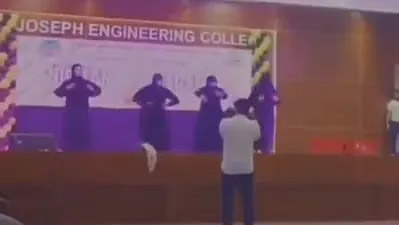
St. Joseph Engineering College Clarifies That Burqa-Clad Male Students Dancing On Item Song Were Muslims And Not Hindus As Claimed
- Campus Updates
- 12 Dec, 2022
- 1026
An engineering college in Karnataka’s Mangaluru city took to social media to clarify false claims that a group of Hindu students wore burqas and danced on an ‘item number’ on stage in order to mock the piece of Islamic clothing.
The students who did this were Muslims, the college said, adding that four students had been suspended pending inquiry for violating guidelines for the college event at which they performed.
Earlier this week, a video went viral on social media showing some men dancing on the Bollywood song ‘Fevicol Se’ while wearing full-body burqas exposing only the face, in a college event.
Several Twitter users posted the video with false claims that the men doing that were Hindus and their intention was to mock burqa and hijab over the recent controversy over insistence of some Muslim girls to wear it inside classrooms.
For instance, a Twitter user wrote, “Hindu students in an event at St Joseph Engineering College, Mangalore students in blatant Islamophobic act seen wearing hijab and performing obscene steps for a item song mocking Muslim minorities Burqa (sic).” Another user wrote, “Strict action should be taken against St Joseph engineering college, Mangalore for such event organised for mocking Muslims.”
On Thursday, management of the college, St Josephy Engineering College, posted on their Twitter account a clarification. It said:
“The video clip being circulated on social media has captured a part of the dance by students of the Muslim community itself who barged on stage during the informal part of students association inaugural.
“It was not part of the approved program and the students involved have been suspended pending inquiry. The college does not support or condone activities that could harm the harmony between communities and everyone.”
Since December, Karnataka has been witnessing agitations and violence over demands that hijab (veil worn by Muslim women as per some Islamic diktats) should be allowed in schools and colleges beyond their uniform so that Muslim women can “practice their religion”.
After several schools and colleges in the state turned down these demands, especially after Hindu students began sporting saffron scarves in retaliation, the matter went to high court. In March, the Karnataka high court held that hijab was not an essential religious practice in islam as claimed by petitioners, and upheld a state government order enforcing existing dress code.
The petitioners appealed against this verdict in Supreme Court, which gave a spirit verdict in August. The matter is not pending to be heard by a special bench to be formed by the Chief Justice of India. Till the special bench gives its verdict, the state order is legally valid.
At the peak of the hijab-related agitations by the Muslim community in Karnataka, a Hindu man named Harsha was killed by a mob from the Muslim community in February. Harsha was also a volunteer for Bajrang Dal, the young wing of Vishwa Hindu Parishad.
The National Investing Agency that probed the case said in April that Harsha was killed with the “intent of inciting communal violence”.
